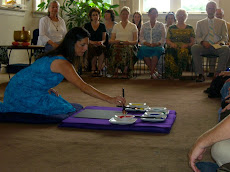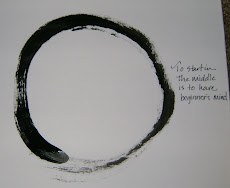The unexamined life is not worth living ~ Socrates
Reflection has been a key component for me as far understanding myself and the part I play in the world. Whether I reflect in dialogue, in silent contemplation, or through writing, I have been able to get to know myself better and gain a clearer perspective of who I am, what I think, and how I feel.
My students also seem to be learning about themselves through reflection. Literature has often been a catalyst for my students (and myself), and books, plays, song lyrics, spiritual works, and poetry have all incited thoughtful discussions and insightful writings.
Last week, my students were asked to find two different quotes in Lloyd Alexander's The Book of Three, connect them to a greater "life lesson" of some kind, and write about their own thoughts, feelings and experiences in regards to it.
From one of my students:
On page 155, Taran says, "Medwyn would not say so. In the hills, he spoke of kindness for all creatures; and he told me much about the gwythaints. I think that it's important to bring this one to Caer Dathyl. No one has ever captured a live gwythaint, as far as I know. Who can tell what value it might have?" I think that the life lesson here is that we should show kindness for all humans...We cannot tell what a person is really like just by theirappearance. An example of this is Muslims.
I know quite a lot on the subject of Islam and Muslims since more than half of Indonesia's religion is Islam [this student is Indonesian]. When some people see a Muslim or think of one, they think, "Oh, no! I hope they aren't a terrorist, I hope they won't hurt me!" Well, I think that this is just silly. It is judging someone by their appearance without even meeting them. And for all those people who think that all Muslims are terrorists, I CAN CERTAINLY TELL YOU THEY ARE NOT. In fact, most Muslims are very kind and friendly, I even have some friends in Indonesia that are Muslims and I am sure that they are not terrorists.
So we should all show friendliness and kindness for all humans, of any religion, ethnicity, etc., and not judge what they are like just by their appearance or looking at them right away.
From another student:
"She looks like a wonderful pig" - "It's always nice to see two friends meet again. It's like waking up with the sun shining" (Eilonwy, p. 47).
I think that the life lesson that is trying to be shown in Eilonwy's reference is that when you have something that you are ungrateful for, you only realize how much you appreciate it when it's gone. In reading The Book of Three, I learned more about being grateful and thinking about every little thing that affects your life. This could be friends, pets, or homes. I hope that we can all really take notice of the little things in life, because they all add up in the end to something further than we can understand.
In The Book of Three, Coll says to Taran: "You have been at The Book of Three...that is not hard to guess. Now you know better. Well, that is one of the three foundations of learning: see much, study much, suffer much" (Alexander, p. 10). This quote reminds me of the process of prajna: observation, contemplation, and meditation...or observation + knowledge + experience = wisdom.
In her article, The Sharp Sword of Prajna, Judy Lief explains: Prajna is a Sanskrit word literally meaning "best knowledge," or "best knowing." Prajna is a natural bubbling up of curiosity, doubt and inquisitiveness. It is precise, but at the same time it is playful. The awakening of prajna applies to all aspects of life, down to the tiniest details. Our inquisitive interest encompasses all levels, from the most mundane, such as how do I turn on this computer, up to such profound levels as, what is the nature of reality?
It seems to me that my students are applying their "best knowing" to "all aspects of life," as they delve into The Book of Three and make connections between the story and the language, and themselves and how they view the world.
Lief says:
Another image for prajna is the sun: the sun of prajna is illuminating our world. If we're inquisitive, if we're attentive, a kind of natural illumination happens. There is light shining on the dark corners and a sense of being under the spotlight, totally exposed...there's no corner where the sun of prajna isn't shining. Prajna is like having a sun shining all around, everywhere, never setting.
Reflection has become a ritual in my personal life, as well as my classroom. It takes on different forms all the time, so there is no one way to practice it. It is a ritual on one hand, because it is a constant practice and a conscious practice. It is also a ritual because it's very nature begs the practitioner to look more closely, dig a bit deeper, and learn more about him or herself, others and the greater world. It cultivates deeper learning and serves as a platform for making connections.
In her article, Lief writes: "Usually we think that knowledge means having all the answers, but the quality of prajna is more like having all the questions." So, too, is the way of reflection.
Lizard Coloring Page
2 years ago





No comments:
Post a Comment